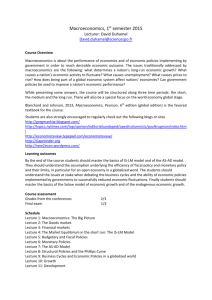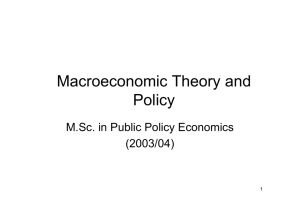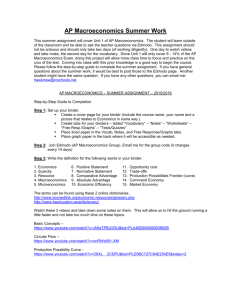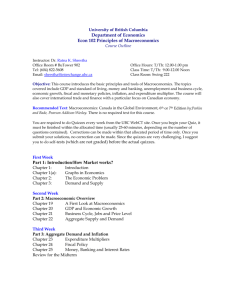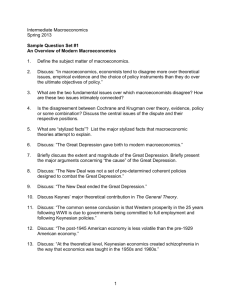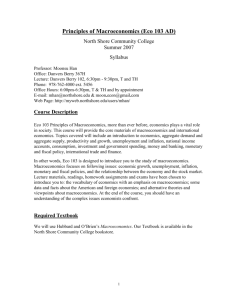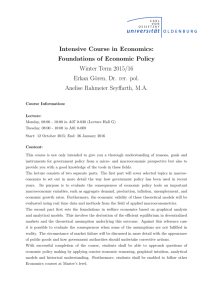Macroeconomics in the Global Economy
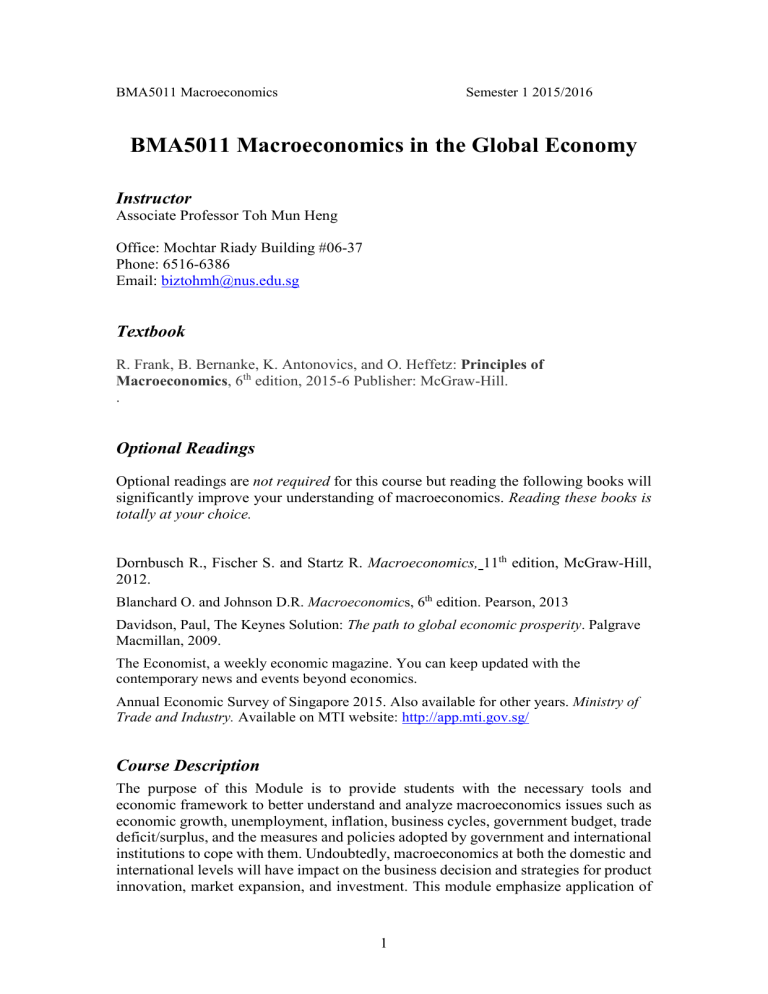
BMA5011 Macroeconomics Semester 1 2015/2016
BMA5011 Macroeconomics in the Global Economy
Instructor
Associate Professor Toh Mun Heng
Office: Mochtar Riady Building #06-37
Phone: 6516-6386
Email: biztohmh@nus.edu.sg
Textbook
R. Frank, B. Bernanke, K. Antonovics, and O. Heffetz: Principles of
Macroeconomics , 6 th
edition, 2015-6 Publisher: McGraw-Hill.
.
Optional Readings
Optional readings are not required for this course but reading the following books will significantly improve your understanding of macroeconomics. Reading these books is totally at your choice.
Dornbusch R., Fischer S. and Startz R. Macroeconomics, 11 th
edition, McGraw-Hill,
2012.
Blanchard O. and Johnson D.R. Macroeconomic s, 6 th
edition. Pearson, 2013
Davidson, Paul, The Keynes Solution: The path to global economic prosperity . Palgrave
Macmillan, 2009.
The Economist, a weekly economic magazine. You can keep updated with the contemporary news and events beyond economics.
Annual Economic Survey of Singapore 2015. Also available for other years. Ministry of
Trade and Industry. Available on MTI website: http://app.mti.gov.sg/
Course Description
The purpose of this Module is to provide students with the necessary tools and economic framework to better understand and analyze macroeconomics issues such as economic growth, unemployment, inflation, business cycles, government budget, trade deficit/surplus, and the measures and policies adopted by government and international institutions to cope with them. Undoubtedly, macroeconomics at both the domestic and international levels will have impact on the business decision and strategies for product innovation, market expansion, and investment. This module emphasize application of
1
the macroeconomic models and analytical framework to real life macroeconomic events in the global economy.
Prerequisite
Students who keep up-to-date with economic development and international trends by reading daily newspapers and other economic magazines will find this course easy, enjoyable and helpful. There is minimal prerequisite of quantitative and mathematical skill for this course, but students are expected to make use of such skill in answering questions during tutorial assignments and the structured project. It will be useful that students refresh themselves with rudimentary parts of microeconomic concepts of supply and demand, price determination, and market clearing, etc.
Assessment
There are 3 components in the assessment scheme. a) Assignments/
Presentation b) Structured Project c) End of semester Test
30%
30%
40%
2
Course Outline
Topics Chapter in F&B
0. Self-Reading: Basic Economic Concepts :: Introduction 1 to 3
1. Macroeconomics: Data and Issues : 4
Circular Flow of Income; National Income Accounts;
GDP;
Valuation: Nominal & Real; Some identities.
2 Macroeconomics: Data and Issues :
Macro Aggregate Indicators: Price Level & Inflation,
Wages & Unemployment ; <deflation; over-heated labor market>
5 to 6
3 Economy in the Long Run
Economic Growth; Determinant of Productivity
7
4
5
Economy in the Long Run
Saving, Capital Formation and Financial Markets
Economy in the Long Run
Money, Prices, Interest rates and the Financial System
6. Economy in the Short Run
Short Term Economic Fluctuations
7. Economy in the Short Run
Spending, Output and Fiscal Policy and Monetary
Policy
8. Economy in the Short Run
AS-AD Model & Effects of Fiscal & Monetary
Policies
10 International Economy
Exchange Rates, International Trade and Capital Flows
11 International Economy
Fiscal and Monetary Policies in Open economies
8
9
10
11 & 12
13 & 14
POE
1 to 3
15
16 - 17
18
19
20
21
22-23
24-25
2 and 15 2 and
15 &
Notes
26
26 &
Notes
ACADEMIC HONESTY & PLAGIARISM
Academic integrity and honesty is essential for the pursuit and acquisition of knowledge. The University and School expect every student to uphold academic integrity & honesty at all times. Academic dishonesty is any misrepresentation with the intent to deceive, or failure to acknowledge the source, or falsification of information, or inaccuracy of statements, or cheating at examinations/tests, or inappropriate use of resources.
Plagiarism is ‘the practice of taking someone else's work or ideas and passing them off as one's own' (The New Oxford Dictionary of English). The University and School will not condone plagiarism. Students should adopt this rule - You have the obligation to make clear to the assessor which is your own work, and which is the work of
3
others. Otherwise, your assessor is entitled to assume that everything being presented for assessment is being presented as entirely your own work. This is a minimum standard. In case of any doubts, you should consult your instructor.
Additional guidance is available at: http://www.nus.edu.sg/registrar/adminpolicy/acceptance.html#NUSCodeofStudentCo nduct
Online Module on Plagiarism: http://emodule.nus.edu.sg/ac/
4
